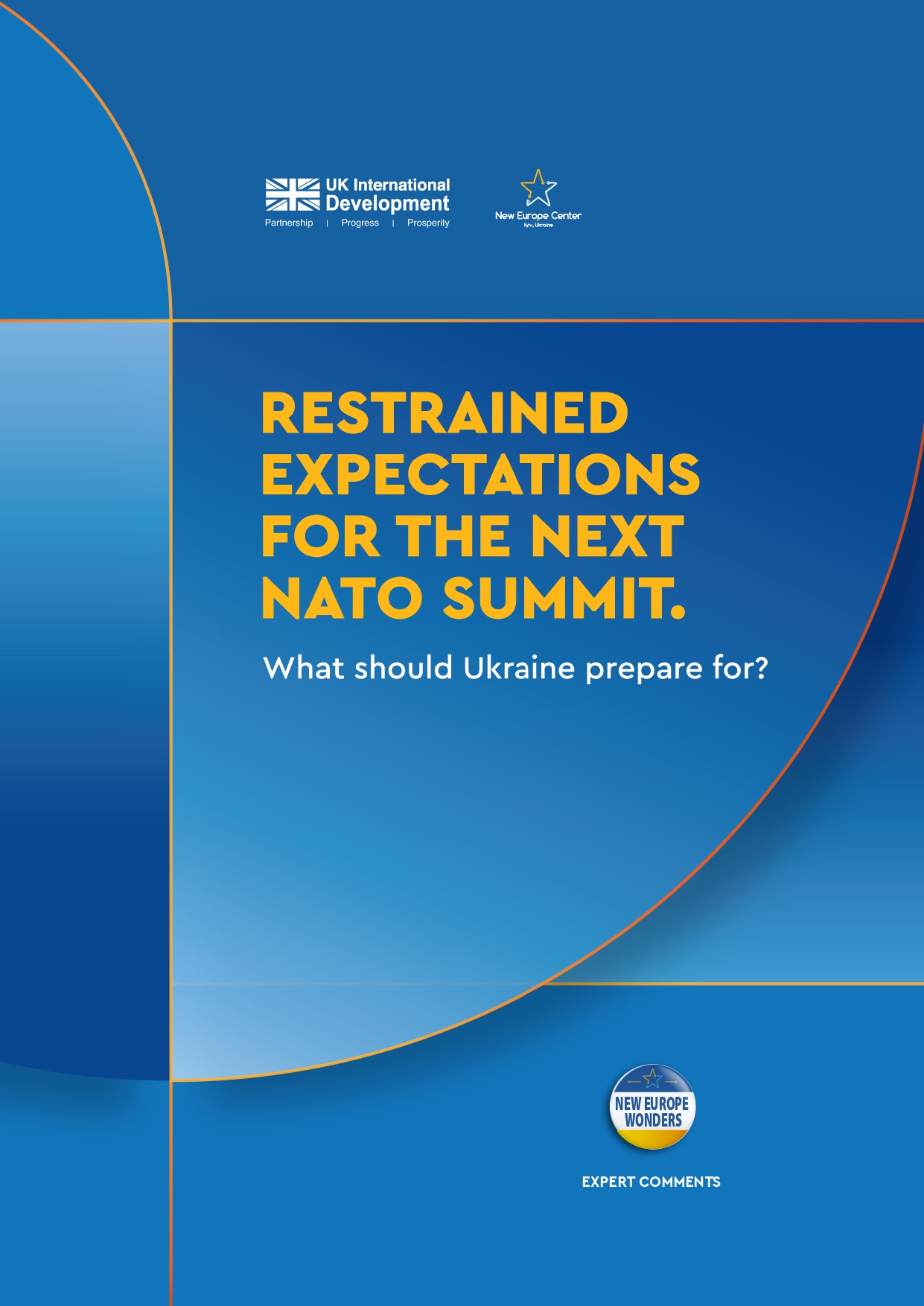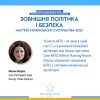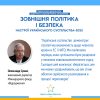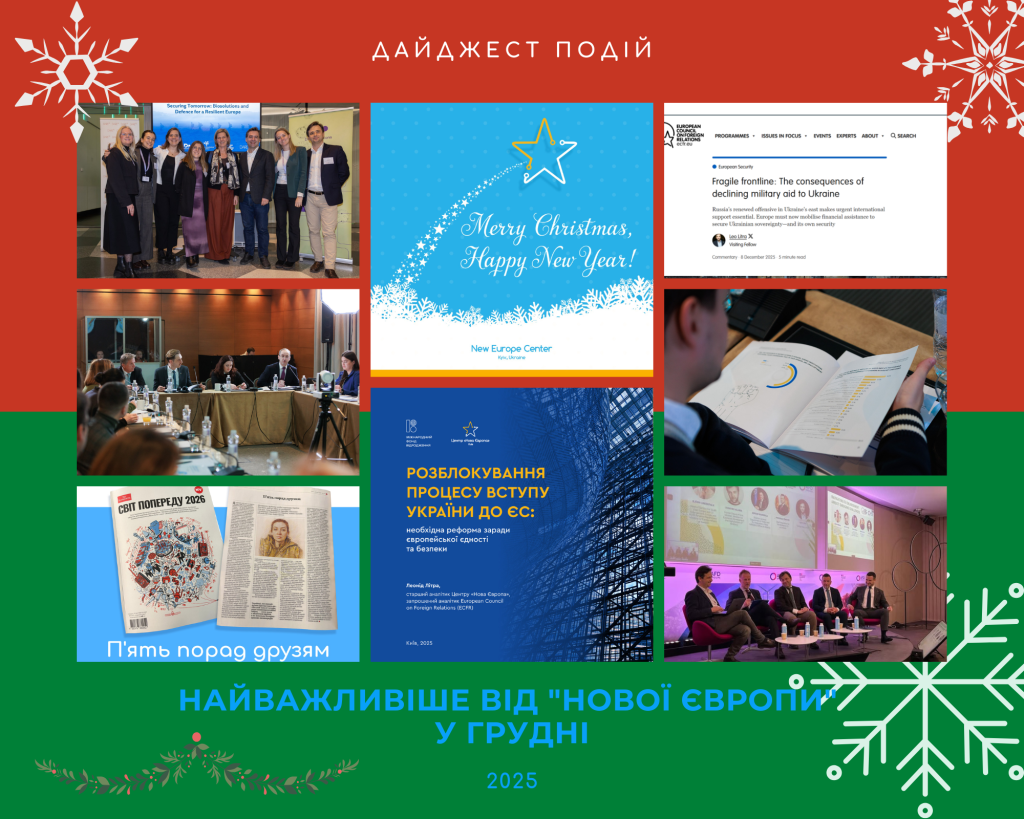
Another NATO summit will take place in The Hague on June 24–25. At first glance, there seems to be little reason for Ukraine to expect breakthroughs. The Alliance’s focus is on internal matters, particularly new commitments regarding defense spending. To avoid tensions, NATO prefers to sidestep discussions that could undermine the fragile unity among allies. How will the current NATO discussions affect Ukraine? What strategy should official Kyiv adopt? The New Europe Center reached out to leading experts to explore: what opportunities do the NATO Summit in The Hague hold for Ukraine, despite restrained expectations?
Key conclusions:
- Important decision for Ukraine – increasing NATO defence spending.
A key topic of the Summit will be the increase in defence spending up to 5% of GDP for all NATO member states. Such boost is necessary for the development of robust and effective defence capabilities in future conflicts. For Ukraine, this will mean a possible receipt of a long-term military assistance and the sending a clear signal of deterrence to Russia.
- Euroatlantic unity is above all. NATO will avoid controversial topics.
Most experts do not hold out much hope for breakthroughs in The Hague: NATO allies will try to avoid any escalation with the US President Donald Trump. This, approach, in particular, excludes discussion of Ukraine’s future membership in NATO.
- Ukraine should focus on ‘quiet’ successes and diplomatic victories.
Given the unlikelihood of significant breakthroughs, Ukraine and its key partners should concentrate on quiet but effective diplomatic victories. Such achievements could include greater US involvement and the securing of long-term military support mechanisms.
- Ukraine should look for other ways to obtain clear security guarantees.
With NATO membership in question, Ukraine should consider new opportunities to obtain interim, temporary security guarantees (possibly on a bilateral level). Ways to achieve this goal include gradual integration into the Joint Expeditionary Force, enhancing bilateral cooperation, and building up the Ukrainian defence industry.
- The key to European security is a strong Ukraine.
Ukraine should not be treated as a suppliant of NATO membership, but rather a core asset in safeguarding Europe from Russian aggression. To strengthen this role, partners should invest and develop Ukraine’s defence sector. In the future, this could establish Ukraine as ‘arsenal of democracy’.
Dr. Stefanie Babst, Former NATO Deputy Assistant Secretary General, Germany
The NATO allies’ gathering in The Hague is not bound to produce any significant strategic outcome. Since Europeans and Canadians continue to remain trapped in U.S. President Trump’s ‘Make America Great Again’ roller-coasting, their prime focus is to prevent him from pulling the U.S. security rug altogether from under their feet. However, the chances for them to succeed are slim.
My recommendation for Ukraine is to pursue a dual-track approach: it should use the NATO Summit to press the allies mercilessly on more robust and timelier military and financial aid, notably with a view to defend against Moscow’s summer offensive and aspirations to grab even bigger pieces of Ukrainian territory. In parallel, however, and politically more discreet the Ukrainian leadership should discuss with the group of its most dedicated European backers the strategic way ahead. If NATO’s front door will remain closed in the near future, and the deployment of a European reassurance force moves to a distant future because of the Russian regime’s refusal to negotiate any meaningful truce, Ukraine must find other ways to obtain the necessary hard-core security guarantees. An incremental integration in the An incremental integration in the Joint Expeditionary Force[1] may be an avenue worth exploring. There may well be other inroads through NATO’s backdoor. Bottom line is that Ukraine has become the new strategic centre of gravity in Europe. It should no longer be treated as a suppliant of NATO membership but a core asset in safeguarding Europe from Russian aggression.
James Carafano, Senior Counselor to the President and E.W. Richardson Fellow, Heritage Foundation, USA
A free and independent Ukraine, in or out of NATO, that can defend itself and thrive is tremendously beneficial to the security, liberty, and prosperity of the alliance and the transatlantic community. We know, at present, there is no consensus for Ukraine joining NATO, even EU enlargement including the country could far off. No matter, there are many steps that can be taken now that strengthen Ukraine and the nation’s place in the European and transatlantic communities. Specifically, there are actions that NATO and its members can take.
First, and foremost, Ukraine can be an arsenal of democracy, not just for Ukraine, but for Europe and other international partners. Investing in the development of a robust and resilient Ukrainian defense sector, leveraging the incredible innovation and productivity, that the national defense sector has already demonstrated, ought to be a top priority. In particular, developing a Ukrainian industrial base delivering systems and capabilities ought to be top priority.
Second, NATO nations on a bilateral level can coordinate and develop joint and complimentary capabilities that enhance air and missile defenses.
Third, NATO and NATO members can promote and develop regional infrastructure, including digital and energy, that not only integrate Ukraine into the European economy but provide a more robust logistic infrastructure for the security of NATO’s eastern flank.
Fredrik Wesslau, Distinguished Policy Fellow, Stockholm Center for Eastern European Studies (SCEEUS), Sweden
The NATO summit in The Hague will be a short and scripted affair – all in an effort to minimise the risk of Trump lobbying hand grenades into the leaders’ meeting as he has done during previous NATO summits.
Focus will be on new defence spending goals – 5% of GDP – rather than Ukraine. But European Allies remain firmly behind Ukraine. They will do their best to demonstrate their continued support and may announce new support packages for Ukraine in the margins of the summit.
NATO Secretary General Mark Rutte has warned that Russia could be ready to launch an attack on NATO by 2030 and called on Europe to turbocharge its military build-up to counter the threat of a Russian attack.
An increase in European defence spending is good for Ukraine for two reasons. One is that strengthened European defence capabilities will contribute to overall deterrence. The second is that some of this additional spending can go to military assistance to Ukraine.
At the end of the day, the best possible investment in European security today is to ramp up military assistance to Ukraine and to invest in Ukraine’s defence sector.
Eric Ciaramella, Senior Fellow, Russia and Eurasia Program, Carnegie Endowment for Peace, USA
Expectations for this year’s NATO summit in The Hague are indeed limited. But if the allies show President Trump that they are willing to spend 5 percent of GDP on defense and defense-related expenses, that would send a strong message that the alliance is on a path to build up substantial deterrence capabilities in the coming years. That’s also a powerful message for Ukraine, since a portion of this increased spending will no doubt go towards producing equipment and ammunition for the Ukrainian army under various national and European financing programs. When it comes to Ukraine’s future membership in NATO, it would be best for the allies simply to say nothing. There will be no consensus either on last year’s communique language or on a new formulation. Better to “let sleeping dogs lie,” as we say. Finally, Ukraine and NATO allies can send a strong signal to Russia about their vision for a peace settlement by embracing the U.S. administration’s push for a ceasefire under certain parameters—namely that Ukraine should have no limits on its ability to defend itself, including through the supply of weapons and training from partners. Getting President Trump on board with such a declaration would be a major diplomatic win for Ukraine and Europe.
Leonid Litra, Senior Research Fellow at New Europe Center, Visiting Fellow at ECFR, Ukraine
The NATO summit in The Hague does not envisage any breakthrough for Ukraine. Instead, the Alliance will focus on defence spending and unity. That doesn’t mean that Ukraine cannot gain meaningful support at the summit.
Ukraine’s top priority – NATO membership – has been put aside until there is a leader in the US who would rightly see Ukraine’s belonging to the Alliance as essential to ending the war and achieve sustainable peace. But in the current mode of war of attrition, Ukraine desperately needs the capacity and means to defend against Russian aggression.
The new spending targets will likely be agreed upon, and NATO will be able to have robust and far-reaching financial capabilities to prepare for future conflicts. If the military aid to Ukraine is counted as official budget contributions toward the new NATO target, then Kyiv may gain a crucial long-term support mechanism that provides access to military aid, logistics, and defence integration. What appears to be a small detail may have long-lasting implications for Ukraine that would make it part of the NATO equation. That would also make Ukraine less vulnerable to political turbulence and ad hoc decisions that could undermine Kyiv’s ability to defend itself. The summit in The Hague won’t bring a loud victory for Ukraine, but it may bring a quiet success.
Nona Mikhelidze, Senior Fellow, Istituto Affari Internazionali (IAI), Italy
Despite restrained expectations, the NATO Summit in The Hague offers a vital opportunity for Ukraine – not just to seek support, but to reshape the narrative. For too long, the discourse has centred on what NATO can offer Ukraine. It is time to emphasize what Ukraine offers NATO.
Ukraine’s battlefield experience, strategic geographic position, and resilience in the face of Russian aggression have made it a de facto pillar of European security. Its military has tested NATO-standard interoperability under real war conditions, offering invaluable insights into drone technology, hybrid warfare and civilian resilience. Rather than being a passive aspirant, Ukraine has shown that it is already contributing to the Alliance’s core mission: defending democracy and deterring military aggression.
The Summit should therefore serve not only as a platform to reaffirm long-term political support, but also to signal a shift in mindset. NATO needs to move beyond rhetorical reassurance and recognize that Ukraine is not merely a recipient of security – it is a provider of it. Elevating this view within the Alliance would not only strengthen deterrence but also reinforce NATO’s credibility in defending its values. In this sense, Ukraine’s path to membership is not a concession, but a strategic imperative.
[1] Joint Expeditionary Force – is a multinational coalition (Baltic States, Nordic States, Netherlands, and the UK), designed for rapid response and expeditionary operations.
PDF-version is here.
This material was funded by the UK government as part of the “Mutual Transformative Power: changing Ukraine through cooperation with wider Europe” project, implemented by the New Europe Center. The views expressed in this material are those of the author(s) and may not coincide with the official position of the UK government.







